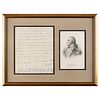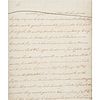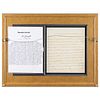Benedict Arnold Autograph Letter Signed on Lumber Trade
Two ways to bid:
- Leave a max absentee bid and the platform will bid on your behalf up to your maximum bid during the live auction.
- Bid live during the auction and your bids will be submitted real-time to the auctioneer.
Bid Increments
| Price | Bid Increment |
|---|---|
| $0 | $5 |
| $50 | $10 |
| $200 | $25 |
| $500 | $50 |
About Auction
Jul 12, 2023
RR Auction support@rrauction.com
- Lot Description
ALS signed “B. Arnold,” one page both sides, 7 x 8.5, February 1, 1788. Handwritten letter by Benedict Arnold discussing his New Brunswick lumber trade with the United States and the misuse of his name as debt security. In part: "In the Spring of 1786, Capt. Abiather Camp was Employed by me to barter some provisions in the States for Lumber, and to agree for a quantity of Lumber to be paid for in Goods. He went to Machias, where contrary to my Instructions he trusted his Goods, (which have never been paid for) and Contracted in his Own Name to Deliver Sails & Cordage, Anchors etc. for a vessel, and receive Lumber in payment, in expectation that I would furnish the Goods, but as, on his return I had not the Goods he Applied to Mesr. McGeorge & Co. to furnish the Articles & take Lumber in payment, as the People with whom the Contract was made, were strangers to him, they wished me to be Security, which I offered to do provided they would give me a Commission‰Û_which they declined, & delivered the Goods to Capt. Camp‰Û_They in my Absence pretended to Mr. Hervey that, I had obligated myself for the payment of the Debt and to prevent a Suit Mr. Hervey was induced to draw a Bill on me for the Amt. of their Demand, which has been returned Protected for which they have now sued him." A late 19th-century presentation inscription is written along the bottom in another hand. Handsomely double-matted and framed with an engraved portrait (featuring a facsimile signature) to an overall size of 17.75 x 13.5, with a window in the backing for viewing the reverse. In fine condition.
In 1785, after living in London for several years, Benedict Arnold returned to North America to live in St. John's, New Brunswick, and entered into a mercantile business with his sons, Richard and Henry. He soon became thoroughly disliked by both Loyalists and Americans in the area due to a series of bad business deals and legal battles, filing frequent lawsuits over petty debts—which he refers to in the present letter. Further, this letter appears to relate to one of his troubled business ventures, with a Captain Abiathar Camp Sr. (1732-1788), who was born in Durham, Connecticut, but moved to Saint John because he was a loyalist during the Revolution. A desirable autograph letter signed by one of the most notorious figures of the American Revolution. - Shipping Info
-
Bidder is liable for shipping and handling and providing accurate information as to shipping or delivery locations and arranging for such. RR Auction is unable to combine purchases from other auctions or affiliates into one package for shipping purposes. Lots won will be shipped in a commercially reasonable time after payment in good funds for the merchandise and the shipping fees are received or credit extended, except when third-party shipment occurs. Bidder agrees that service and handling charges related to shipping items which are not pre-paid may be charged to a credit card on file with RR Auction. Successful international Bidders shall provide written shipping instructions, including specified Customs declarations, to RR Auction for any lots to be delivered outside of the United States. NOTE: Declaration value shall be the item’(s) hammer price and RR Auction shall use the correct harmonized code for the lot. Domestic Bidders on lots designated for third-party shipment must designate the common carrier, accept risk of loss, and prepay shipping costs.
-
- Buyer's Premium



 EUR
EUR CAD
CAD AUD
AUD GBP
GBP MXN
MXN HKD
HKD CNY
CNY MYR
MYR SEK
SEK SGD
SGD CHF
CHF THB
THB














